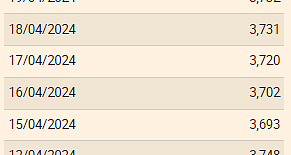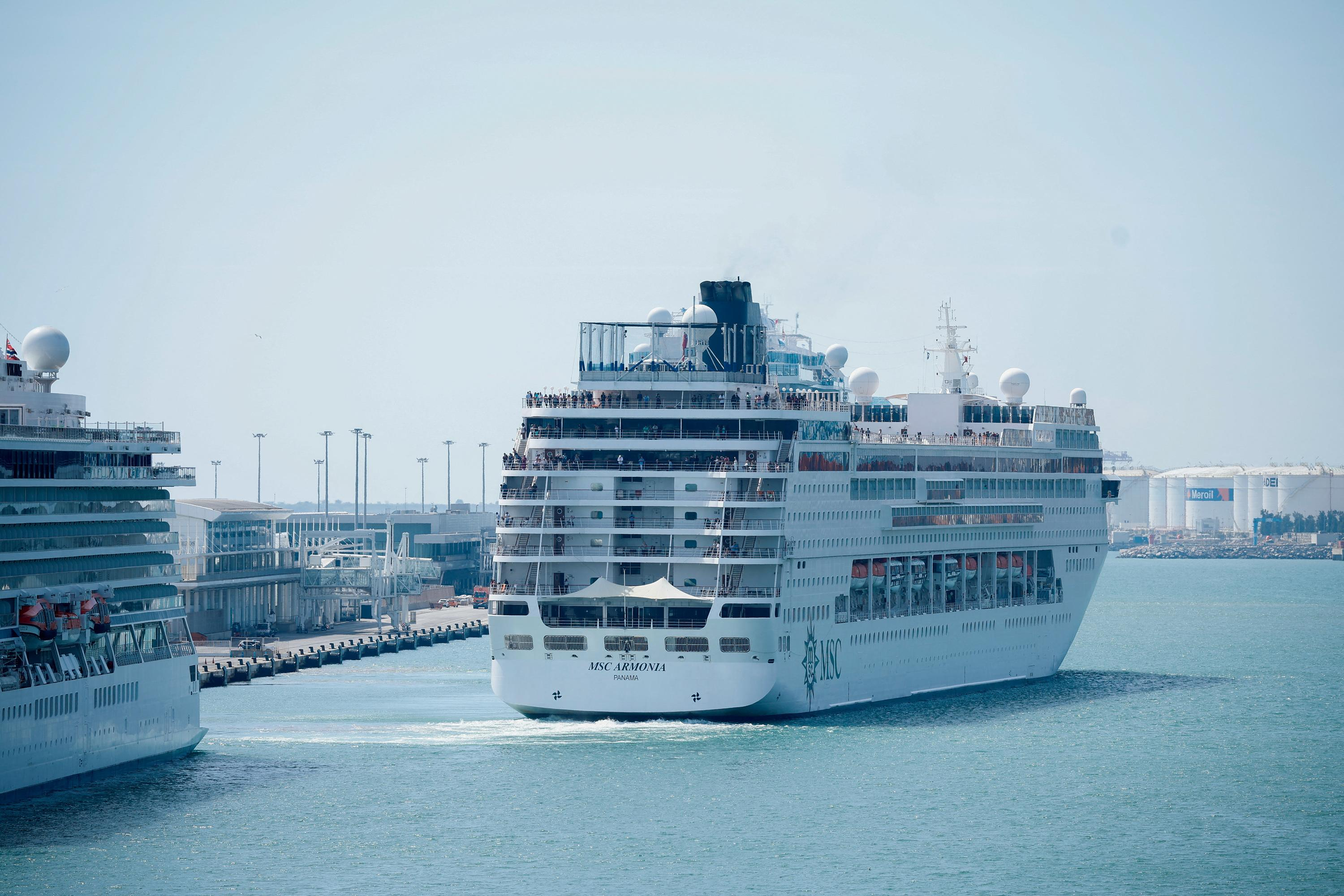It was in 2012, when China took control of this reef in the Philippines. Since then, the 31-year-old fisherman no longer dares to venture there.
"Their ships are made of steel, ours are made of wood," sighs Mr. Villamonte, who recalls how two Chinese vessels chased his canoe before tearing it to pieces.
This fishing area, exploited by generations of Filipino fishermen, is one of the potential triggers for a military conflict in the South China Sea.
China and Taiwan both claim sovereignty over almost all of this sea, while the Philippines, Vietnam, Malaysia and Brunei dispute parts of it.
The trade that passes through it accounts for trillions of dollars each year.
Of all the countries that claim it, China is imposing itself there the strongest, deploying its coastguards and hundreds of vessels like a swarm around the reefs, harassing and attacking fishing boats, while intervening in gas and oil exploration or in ongoing scientific research.
Beijing seeks, according to analysts, to establish its supremacy and to control all activity in these disputed waters, even if it means using military force.
"They really imagine themselves at the center of this region, economically, politically and militarily" until "the weaker countries eventually give up", explains Jay Batongbacal, director of the Institute of Maritime Affairs and the sea at the University of the Philippines.
- "Chinese dream" -
To claim this right, the world's second-largest economy invokes the "nine-dash line", a vague demarcation drawn from maps from the 1940s.
The Philippines filed a complaint against China, but an international court ruled in favor of Manila, finding that Beijing's claims have "no legal basis", a judgment that China has nevertheless ignored.
In a decade of presidency Xi Jinping - who is preparing to obtain a third term - Beijing has continued to strengthen its presence in this disputed sea. Not for its wealth in fuels or fish, says Gregory Poling, director of the American Maritime Transparency Initiative in Asia (AMTI).
Xi's main goal is, according to the expert, to realize the "Chinese dream", that of making China a technologically advanced, powerful and prosperous country by 2050 to ensure its political legitimacy.
Since 2013, Beijing has torn up some 6,000 hectares of reefs to create 1,300 hectares of artificial islands in the Spratly archipelago, reports Mr. Poling.
These militarized islands allow Chinese vessels to patrol as far as Indonesia and Malaysia.
Acts which not only destroy the breeding grounds of marine fauna but contravene international law, underlines Gregory Poling.
Under the terms of the United Nations Convention on the Law of the Sea, adopted in 1982 with the assistance of China, the exclusive right of a country to exploit natural resources is exercised within 200 nautical miles of its coasts.
But Beijing's claims extend to almost a thousand miles.
- Like a "thief in his own backyard" -
Since the Chinese takeover of the Scarborough reef, Mariel Villamonte has been deprived of a significant source of income, like other fishermen in the village of Cato, in the northern province of Pangasinan.
In the 1980s, these families had taken over the Scarborough reef, a precious shelter during storms that provided an abundance of fish.
From now on, they can only count on the "payaos", floating devices anchored far from the reef which attract yellowfin tuna, and which the Chinese boats seem to ignore.
After decades of overfishing from surrounding countries, Filipino fishermen find themselves forced to spend more time at sea and fall back on smaller fish.
Despite the risks, they sometimes venture into Scarborough like "thieves in their own backyard", underlines Christopher de Vera, whose team members went there at nightfall.
But these shallow waters are no longer teeming with fish as they once were, the 53-year-old fisherman regrets, blaming Chinese giant clam fishermen for "decimating" the coral.
- "Worst nightmare" -
China's growing assertiveness has so far not been challenged by Southeast Asian countries, due to differences between Beijing's allies and rivals.
The United States is considered the only country powerful enough to challenge China.
If the recent Chinese military exercises around Taiwan raise fears of a military escalation, Beijing seems for the moment to want to avoid war.
“They are masters in the art of avoiding crossing that threshold,” argues John Blaxland, international security and intelligence expert at the Australian National University.
For Mr. Poling, the sea could soon turn into a "Chinese lake" after ousting fishermen, coast guards and even gas and oil companies, who do not prefer to take the risk of venturing there.
The fishermen are the first to pay the price.
In the past, Mr. Villamonte earned around 6,000 pesos (102 euros) per trip, compared to at best 2,000 (34 euros) today, or nothing at all.
Fishing is all this fisherman's son and grandson can do.
His "worst nightmare" would be to lose access to the rest of Philippine waters. "My family will be hungry," he sighs.
scholarship-amj/ser/nzg/chv

 The Euribor today remains at 3.734%
The Euribor today remains at 3.734% Germany: the trial of an AfD leader, accused of chanting a Nazi slogan, resumes this Tuesday
Germany: the trial of an AfD leader, accused of chanting a Nazi slogan, resumes this Tuesday New York: at Columbia University, the anti-Semitic drift of pro-Palestinian demonstrations
New York: at Columbia University, the anti-Semitic drift of pro-Palestinian demonstrations What is Akila, the mission in which the Charles de Gaulle is participating under NATO command?
What is Akila, the mission in which the Charles de Gaulle is participating under NATO command? What High Blood Pressure Does to Your Body (And Why It Should Be Treated)
What High Blood Pressure Does to Your Body (And Why It Should Be Treated) Vaccination in France has progressed in 2023, rejoices Public Health France
Vaccination in France has progressed in 2023, rejoices Public Health France Food additives suspected of promoting cardiovascular diseases
Food additives suspected of promoting cardiovascular diseases “Even morphine doesn’t work”: Léane, 17, victim of the adverse effects of an antibiotic
“Even morphine doesn’t work”: Léane, 17, victim of the adverse effects of an antibiotic MEPs validate reform of EU budgetary rules
MEPs validate reform of EU budgetary rules “Public Transport Paris 2024”, the application for Olympic Games spectators, is available
“Public Transport Paris 2024”, the application for Olympic Games spectators, is available Spotify goes green in the first quarter and sees its number of paying subscribers increase
Spotify goes green in the first quarter and sees its number of paying subscribers increase Xavier Niel finalizes the sale of his shares in the Le Monde group to an independent fund
Xavier Niel finalizes the sale of his shares in the Le Monde group to an independent fund Owner of Blondie and Shakira catalogs in favor of $1.5 billion offer
Owner of Blondie and Shakira catalogs in favor of $1.5 billion offer Cher et Ozzy Osbourne rejoignent le Rock and Roll Hall of Fame
Cher et Ozzy Osbourne rejoignent le Rock and Roll Hall of Fame Three months before the Olympic Games, festivals and concert halls fear paying the price
Three months before the Olympic Games, festivals and concert halls fear paying the price With Brigitte Macron, Aya Nakamura sows new clues about her participation in the Olympics
With Brigitte Macron, Aya Nakamura sows new clues about her participation in the Olympics Skoda Kodiaq 2024: a 'beast' plug-in hybrid SUV
Skoda Kodiaq 2024: a 'beast' plug-in hybrid SUV Tesla launches a new Model Y with 600 km of autonomy at a "more accessible price"
Tesla launches a new Model Y with 600 km of autonomy at a "more accessible price" The 10 best-selling cars in March 2024 in Spain: sales fall due to Easter
The 10 best-selling cars in March 2024 in Spain: sales fall due to Easter A private jet company buys more than 100 flying cars
A private jet company buys more than 100 flying cars This is how housing prices have changed in Spain in the last decade
This is how housing prices have changed in Spain in the last decade The home mortgage firm drops 10% in January and interest soars to 3.46%
The home mortgage firm drops 10% in January and interest soars to 3.46% The jewel of the Rocío de Nagüeles urbanization: a dream villa in Marbella
The jewel of the Rocío de Nagüeles urbanization: a dream villa in Marbella Rental prices grow by 7.3% in February: where does it go up and where does it go down?
Rental prices grow by 7.3% in February: where does it go up and where does it go down? Europeans: “All those who claim that we don’t need Europe are liars”, criticizes Bayrou
Europeans: “All those who claim that we don’t need Europe are liars”, criticizes Bayrou With the promise of a “real burst of authority”, Gabriel Attal provokes the ire of the opposition
With the promise of a “real burst of authority”, Gabriel Attal provokes the ire of the opposition Europeans: the schedule of debates to follow between now and June 9
Europeans: the schedule of debates to follow between now and June 9 Europeans: “In France, there is a left and there is a right,” assures Bellamy
Europeans: “In France, there is a left and there is a right,” assures Bellamy These French cities that will boycott the World Cup in Qatar
These French cities that will boycott the World Cup in Qatar Serie A: Bologna surprises AS Rome in the race for the C1
Serie A: Bologna surprises AS Rome in the race for the C1 Serie A: Marcus Thuram king of Italy, end of the debate for the position of number 9 with the Blues?
Serie A: Marcus Thuram king of Italy, end of the debate for the position of number 9 with the Blues? Milan AC-Inter Milan: Thuram and Pavard impeccable, Hernandez helpless… The tops and flops of the derby
Milan AC-Inter Milan: Thuram and Pavard impeccable, Hernandez helpless… The tops and flops of the derby Ligue 2: Auxerre leader, Bordeaux in crisis, play-offs... 5 questions about an exciting end of the season
Ligue 2: Auxerre leader, Bordeaux in crisis, play-offs... 5 questions about an exciting end of the season


















